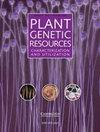番茄(Solanum lycopersicum L.)抗tolcv株系遗传组合、园艺性状杂种优势分析及Ty基因的分子验证
IF 0.7
4区 生物学
Q3 PLANT SCIENCES
Plant Genetic Resources: Characterization and Utilization
Pub Date : 2022-01-07
DOI:10.1017/s1479262121000630
引用次数: 3
摘要
番茄是世界范围内具有重要营养价值、经济价值和生物技术应用价值的蔬菜作物。番茄卷叶病毒(ToLCV)是一种通过白蝇(烟粉虱)传播的begomavirus,对番茄生产造成严重损失。在此背景下,本研究旨在确定具有高产、抗ToLCV和重要经济性状的基因作用模式的杂种优势组合。为此,将11个预筛选的自交系以半双列杂交方式杂交,得到55个F1杂交种。对55份11个亲本的杂交组合进行了不同的园艺性状和对ToLCV的抗性评价。用SCAR标记TG0302和SCAR1进行分子验证,证实亲本及其杂交中存在tolcv抗性基因。杂种IIHR-2902 × IIHR-2852在纯合状态下同时存在Ty-2和Ty-3等位基因。σSCA2和σGCA2的估计有显著性。目标性状的遗传控制受加性和非加性基因效应的影响。σA/D2和σGCA2/σSCA2均小于1,表明除发病率外,非加性基因作用在各性状的表达中占主导地位。亲本IIHR-2919是果实和产量性状的最佳组合。杂交组合IIHR-2913 × IIHR-2898在存在Ty-2和Ty-3基因的情况下表现出较高的产量经济杂种优势。该研究为培育番茄高产抗tolcv杂交品种铺平了道路。本文章由计算机程序翻译,如有差异,请以英文原文为准。
Genetic combining, heterosis analysis for horticultural traits in tomato (Solanum lycopersicum L.) using ToLCV-resistant lines and molecular validation of Ty genes
Tomato is a pivotal vegetable crop worldwide concerning human nutrition, economy and in service to biotechnology. Tomato leaf curl virus (ToLCV) is a begomovirus transmitted through the whitefly (Bemisia tabaci) and is responsible for severe losses in tomato production. In this context, the current investigation was carried out to determine heterotic combiners with high yield, resistance to ToLCV and mode of gene action for economically important traits. For this, 11 prescreened inbred lines were crossed in a half diallel fashion to generate 55 F1 hybrids. The 55 crosses with 11 parents and commercial checks were evaluated for different horticultural traits and resistance to ToLCV. The molecular validation with SCAR markers TG0302 and SCAR1 confirmed the presence of ToLCV-resistant genes in parents and their crosses. The hybrid IIHR-2902 × IIHR-2852 showed the presence of both Ty-2 and Ty-3 alleles in the homozygous state. The estimation of σSCA2 and σGCA2 was significant. It also indicated that the genetic control of target traits was under additive and non-additive gene effects. The values of σA/D2 along with σGCA2/σSCA2 found to be less than unity indicates the preponderance of non-additive gene action in the expression of the studied traits except for percent disease incidence. The parental line IIHR-2919 was the best combiner for fruit and yield traits. The cross combinations IIHR-2913 × IIHR-2898 exhibited significantly higher economic heterosis for yield along with the presence of Ty-2 and Ty-3 genes. The study paves the way for breeding high yielding and ToLCV-resistant hybrids in tomato.
求助全文
通过发布文献求助,成功后即可免费获取论文全文。
去求助
来源期刊

Plant Genetic Resources: Characterization and Utilization
Agricultural and Biological Sciences-Agronomy and Crop Science
CiteScore
2.80
自引率
0.00%
发文量
29
审稿时长
>12 weeks
期刊介绍:
Plant Genetic Resources is an international journal which provides a forum for describing the application of novel genomic technologies, as well as their integration with established techniques, towards the understanding of the genetic variation captured in both in situ and ex situ collections of crop and non-crop plants; and for the airing of wider issues relevant to plant germplasm conservation and utilisation. We particularly welcome multi-disciplinary approaches that incorporate both a technical and a socio-economic focus. Technical aspects can cover developments in technologies of potential or demonstrated relevance to the analysis of variation and diversity at the phenotypic and genotypic levels.
 求助内容:
求助内容: 应助结果提醒方式:
应助结果提醒方式:


